Special Report
Companies With the Most (and Least) Female Leadership

Published:
Last Updated:

Despite the strides women have made, stereotypes persist and gender equality is slow coming. As of 2016, a woman earns just above 80 cents for every dollar a man receives — about 20 cents more on the dollar than when the Equal Pay Act passed in the 1960s, yet still far from equitable. The gender gap — pay and representation — tends to be even more pronounced in senior leadership positions at large companies. To this day, some companies do not have any female executives or board members.
Women are inadequately represented in several positions worldwide, most notably within the managerial sector. Only 16 of the 237 companies assessed by research group and equality database LedBetter have female CEOs. Seven of the companies do not have any females in executive positions or on their boards of directors.
To identify the companies with the best and worst female representation, 24/7 Wall St. examined data from research group LedBetter, which created an index of the share of women on the board, as well as the share of women in executive leadership positions at 237 global corporations.
Click here to see which companies have the most female leadership.
Click here to see which companies have the least female leadership.
Click here to see our detailed findings and methodology.

10. Prada Group
> Women in leadership roles: 22% (board), 50% (executive)
> CEO: Patrizio Bertelli and Miuccia Prada Bianchi
> Industry: Apparel
> Notable brands: Prada, Miu Miu, Church’s
> Revenue: $3.74 billion
This iconic Italian luxury fashion company has been swooning fashionistas all over the world for more than 100 years. The company, which sells luxurious items like upscale accessories and luggage, was founded by current CEO Miuccia Prada Bianchi’s grandfather, Mario Prada.. Together with husband Patrizio Bertelli, Prada Bianchi took over the company in the late 1970s. Bertelli’s business plan matched Prada Bianchi’s avant-garde style and has brought much success to the company over the past 40+ years. Prada Bianchi’s influence lead Prada to produce both men and women’s leather goods. Prada Bianchi and CFO Alessandra Cozzani comprise two of the company’s four executive directorships, making Prada’s executive leadership 50% female — one of the largest shares of any large company.
[in-text-ad]
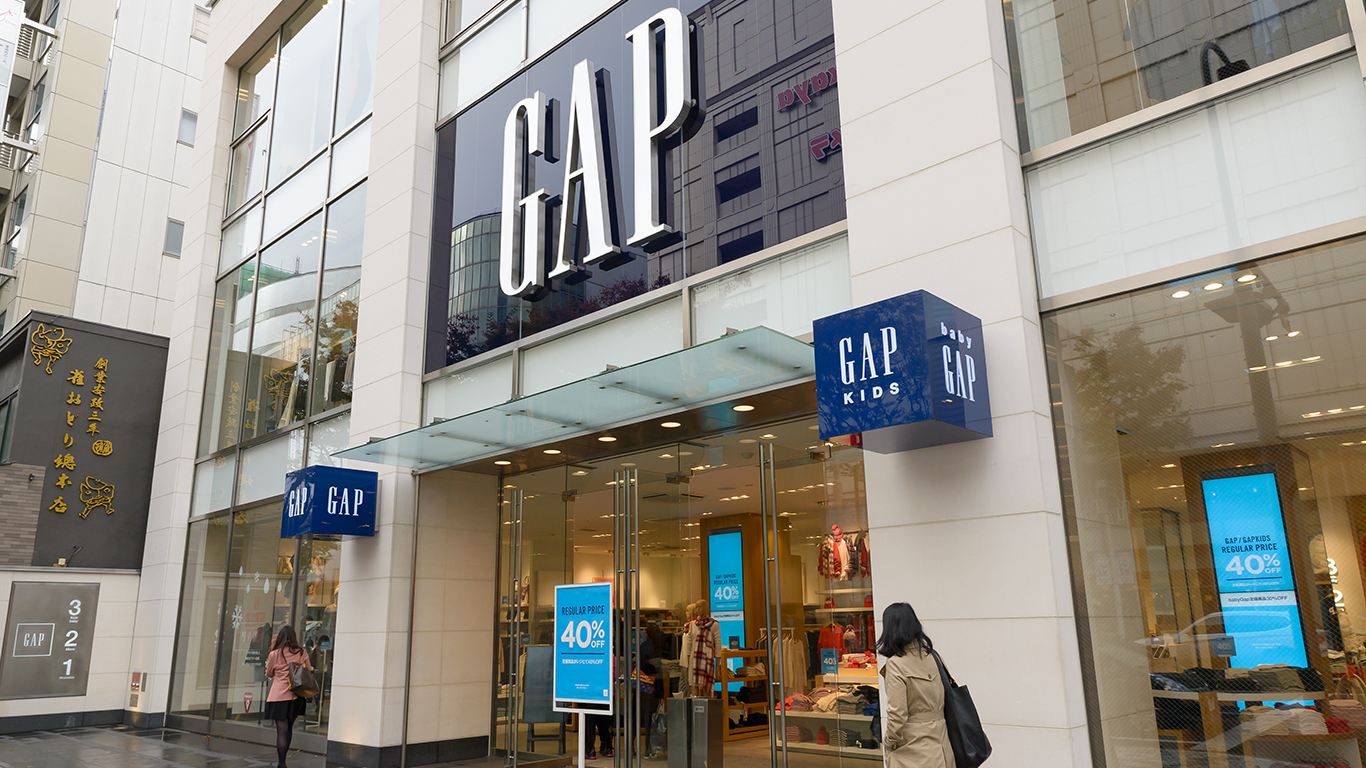
9. Gap, Inc.
> Women in leadership roles: 30% (board), 43% (executive)
> CEO: Art Peck
> Industry: Apparel
> Notable brands: The Gap, Banana Republic, Old Navy
> Revenue: $15.52 billion
Women hold 30% of board positions and 43% of executive positions at Gap, some of the largest shares of any company. In total, women comprise approximately 70% of the apparel retailer’s 135,000-person workforce worldwide. In March 2016, Gap was presented the Catalyst Award, which recognizes corporate initiatives that address the recruitment, development, and advancement of all women. Catalyst honored Gap for its P.A.C.E. program — Personal Advancement & Career Advancement — which provides managerial and life skills to more than 65,000 women throughout 12 countries. Gap was also the first Fortune 500 company to announce that it pays its female and male workers the same wage for the same positions across the globe.

8. Target
> Women in leadership roles: 33% (board), 42% (executive)
> CEO: Brian Cornell
> Industry: Retail
> Notable brands: Archer Farms, Champion, Cherokee
> Revenue: $69.50 billion
Nearly half of Target’s executive positions are filled by women, as well as 33% of the seats on the discount retailer’s board of directors. Also, according to the U.S. Chamber of Commerce Foundation, Target has recently made efforts to encourage young women to become interested in STEM-related fields. Just a few years ago, the company hosted its second Science and Technology Day at Target’s headquarters, where 150 high school girls showed up and saw demonstrations of how the company utilizes science and technology every day. Additionally, female employees at Target earn over half of all management promotions and nearly 50% of the company’s top salaries.

7. Diageo
> Women in leadership roles: 40% (board), 40% (executive)
> CEO: Ivan Menezes
> Industry: Food & beverage
> Notable brands: Smirnoff, Captain Morgan, Bailey’s
> Revenue: $24.26 billion
Women hold 40% of both board and executive leadership positions at alcoholic beverage producer Diageo. Women hold some of the highest ranking positions at Diageo, including CFO Kathryn Mikells, President of Diageo North America Deirdre Mahlan, and General Counsel Siobhan Moriarty — who was also featured on the 2017 Financial Times and HERoes “50 Female Champions of Women in Business” list. In recent years, Diageo has been praised for its use of all-female creative teams and its rebranding of drinks such as Baileys Irish Cream to specifically target female consumers. In June, Diageo and several other companies joined the #Unstereotype Alliance, an initiative led by UN Women which seeks to eliminate gender stereotypes in advertising.
[in-text-ad-2]
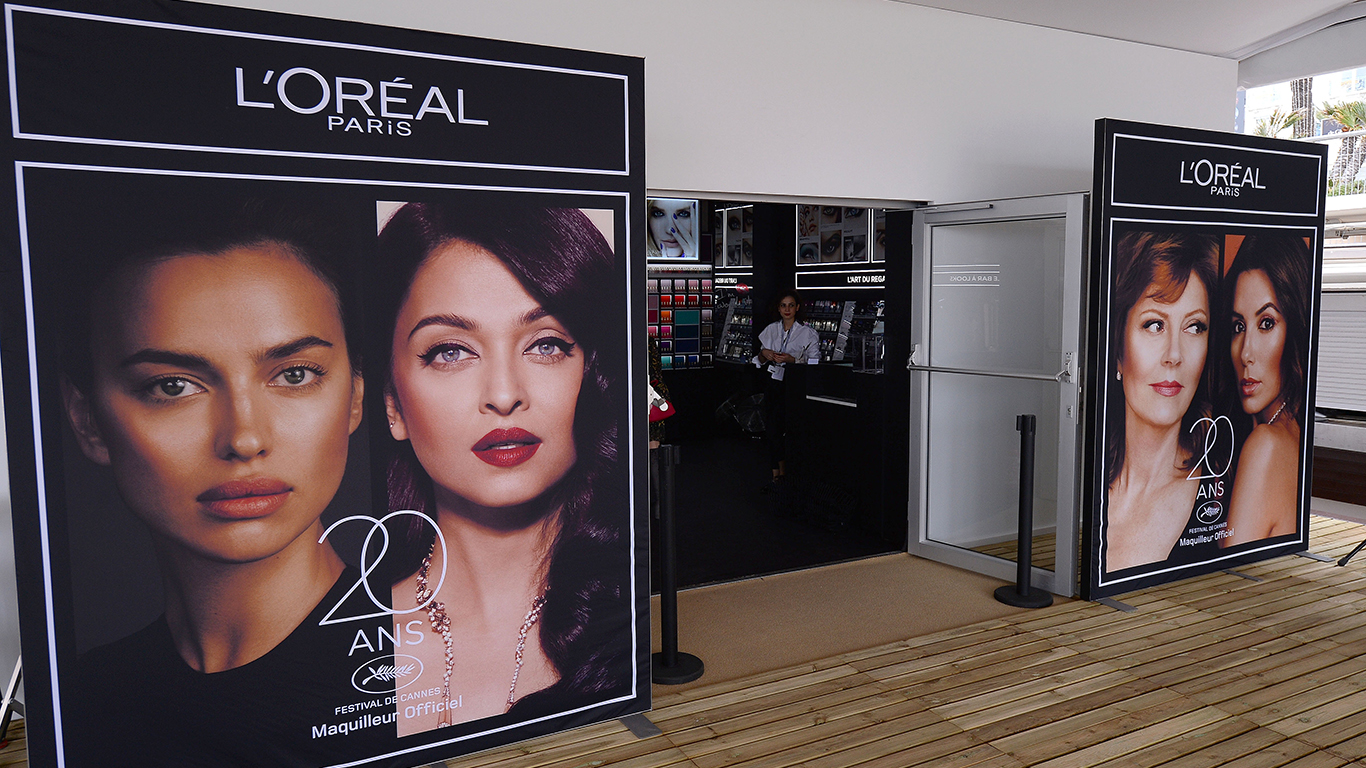
6. L’Oreal
> Women in leadership roles: 47% (board), 33% (executive)
> CEO: Jean-Paul Agon
> Industry: Personal Care
> Notable brands: L’Oreal, Lancôme, Giorgio Armani
> Revenue: $30.51 billion
With 35 well-known brands such as Maybelline and Garnier, all of which sell cosmetics and beauty products, sold in 140 countries, L’Oreal is one of the largest providers of personal care products in the world. The company has a relatively strong female presence across its senior management, with 47% of board seats and 33% of executive positions occupied by women. L’Oreal has has also made recent efforts to cultivate female entrepreneurs both within and outside of its ranks. For example, in 2011 the U.S. division of the company launched the Women in Digital program, which recognizes successful female-founded technology companies and provides them with funding opportunities as well as the chance to pilot a product with L’Oreal USA. Companies that have participated in the program have collectively raised more than $350 million through L’Oreal’s funding network.

5. Best Buy
> Women in leadership roles: 40% (board), 40% (executive)
> CEO: Hubert Joly
> Industry: Retail
> Notable brands: Best Buy, Geek Squad, Magnolia Audio Video
> Revenue: $39.40 billion
Until relatively recently, Best Buy was one of just a handful of companies in which women held a majority of executive positions. The gender balance at the consumer electronics retailer first shifted in April 2016, when Trish Walker was hired as president of service — the sixth woman on a team of 11 executives. While former CFO Sharon McCollam has since resigned from the company and former Chief Human Resources Officer Paula Baker has left the C-suite to preside over U.S. retail stores, women remain in 40% of Best Buy executive positions and board seats. Best Buy began to focus on the cultivation of female leaders within the company in 2007 with the foundation of its Women’s Leadership Forum (WOLF). Since WOLF was founded, the number of female general managers at Best Buy stores rose 40% and sales from female customers increased by $4.4 billion.
[in-text-ad]

4. Kering
> Women in leadership roles: 64% (board), 29% (executive)
> CEO: François-Henri Pinault
> Industry: Apparel
> Notable brands: Kering, Gucci, Alexander McQueen
> Revenue: $14.58 billion
Women comprise an impressive 64% of the seats on fashion giant Kering’s board of directors. Kering, which owns such luxury brands as Gucci and Alexander McQueen as well as sports brand Puma, claims that advancing gender equality is a priority at the company. Aside from making the company an inviting workplace for women, Kering has partnered with Cannes International Film Festival and launched Women in Motion, a program that showcases women’s contributions to the film industry. Kering also created the Kering Foundation, which helps to end harmful traditional, domestic, and sexual violence against women in Europe, the Americas, and Asia.

3. H&M Group
> Women in leadership roles: 64% (board), 35% (executive)
> CEO: Karl-Johan Persson
> Industry: Apparel
> Notable brands: H&M, COS, Monki
> Revenue: $23.63 billion
At fast-fashion retailer H&M, women hold 64% of board and 35% of executive positions. H&M also cultivates female leaders outside of the company through its nonprofit organization, H&M Foundation. In addition to providing funding for several causes across the globe, the H&M Foundation hosts the Foundation 500 — a partnership with Cooperative for Assistance and Relief Everywhere (CARE), which helps female entrepreneurs in poor communities around the world start and develop their own businesses.
While H&M ranks among the best companies for female representation in leadership roles, the company has also been criticized for its treatment of women in its clothing factories. According to one report from the Asia Floor Wage Alliance, workers in Cambodia and India are routinely fired for being pregnant and let go for asking for sick days or refusing overtime.

2. Etsy
> Women in leadership roles: 50% (board), 63% (executive)
> CEO: Josh Silverman
> Industry: Technology
> Notable brands: N/A
> Revenue: $364.97 million
At Etsy, an online marketplace that connects 1.8 million unique sellers more than 30 million active buyers across the globe, 50% of the board seats and 63% of executive positions are held by women. Seeing as nearly 9 out of 10 sellers on Etsy are female, it is fitting that Etsy has made efforts in recent years to increase female representation in the company’s leadership roles. From 2015 to 2016, the number of female managers at Etsy increased by 14%, and the number of women in leadership roles increased by 35%. The company has also taken measures to accommodate employees who identify as neither a man nor a woman. As of 2014, Etsy no longer represents gender in a binary way on its demographic composition reports. In 2015, Etsy converted the bathrooms at its New York City headquarters to be gender inclusive.
[in-text-ad-2]
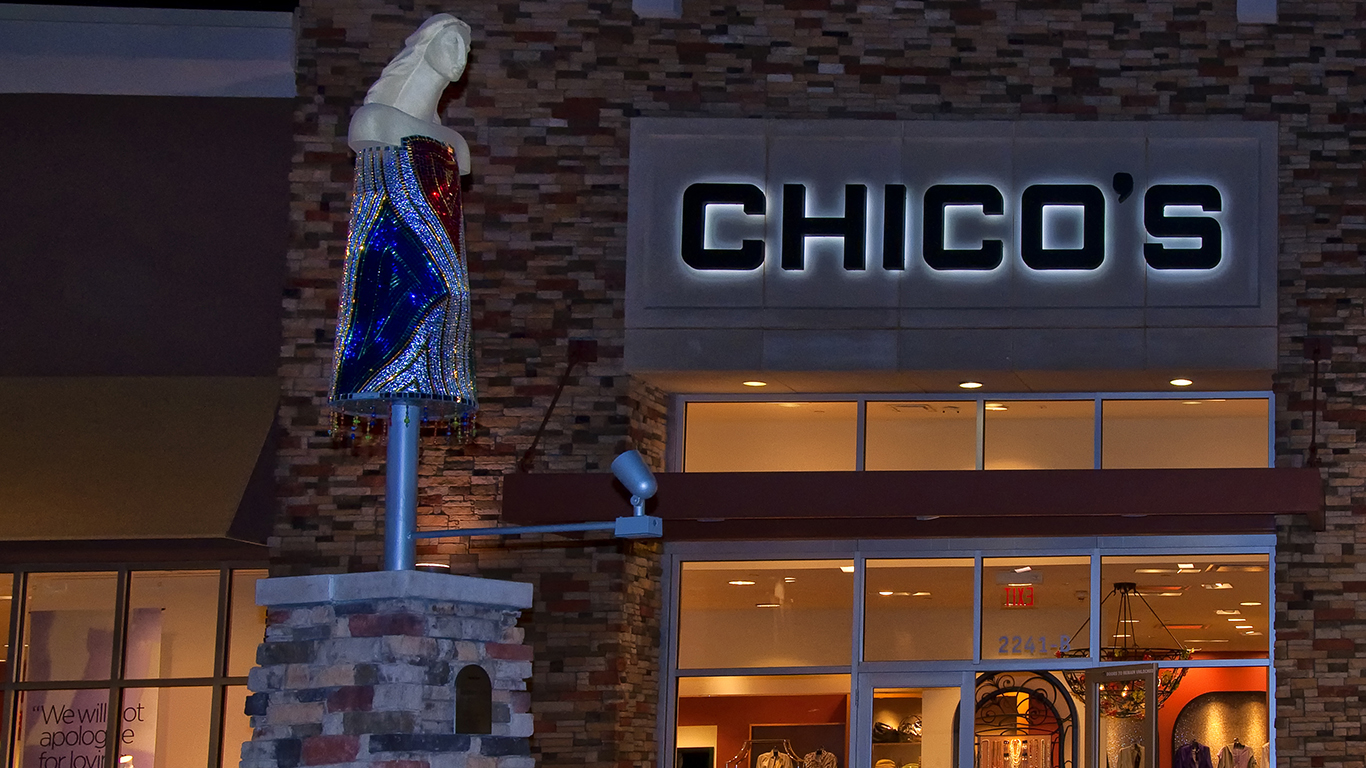
1. Chico’s FAS Inc.
> Women in leadership roles: 56% (board), 73% (executive)
> CEO: Shelley Broader
> Industry: Apparel
> Notable brands: Chico’s, White House Black Market, Soma
> Revenue: $2.48 billion
The company with the greatest female representation among board and executive positions is women’s retailer Chico’s FAS, Inc., at 56% and 73%, respectively. CEO Shelley Broader is one of the few female chief executives among the largest global corporations. Broader began her career as president and CEO of Chico’s FAS, Inc. in 2015, the same year she was featured on Fortune’s Most Powerful Women International List. Broader was hired at a time when Chico’s FAS had been experiencing sluggish sales for years, and was reported to be a buyout target with its stock price down 36% from December 2012 to December 2015. Since then, Broader and her predominantly female executive team have led Chico’s FAS on a successful turnaround, cutting costs and making important hires across the company. Within one year of Broader’s appointment, the company’s share price had risen 41%.
Companies With the Least Female Leadership
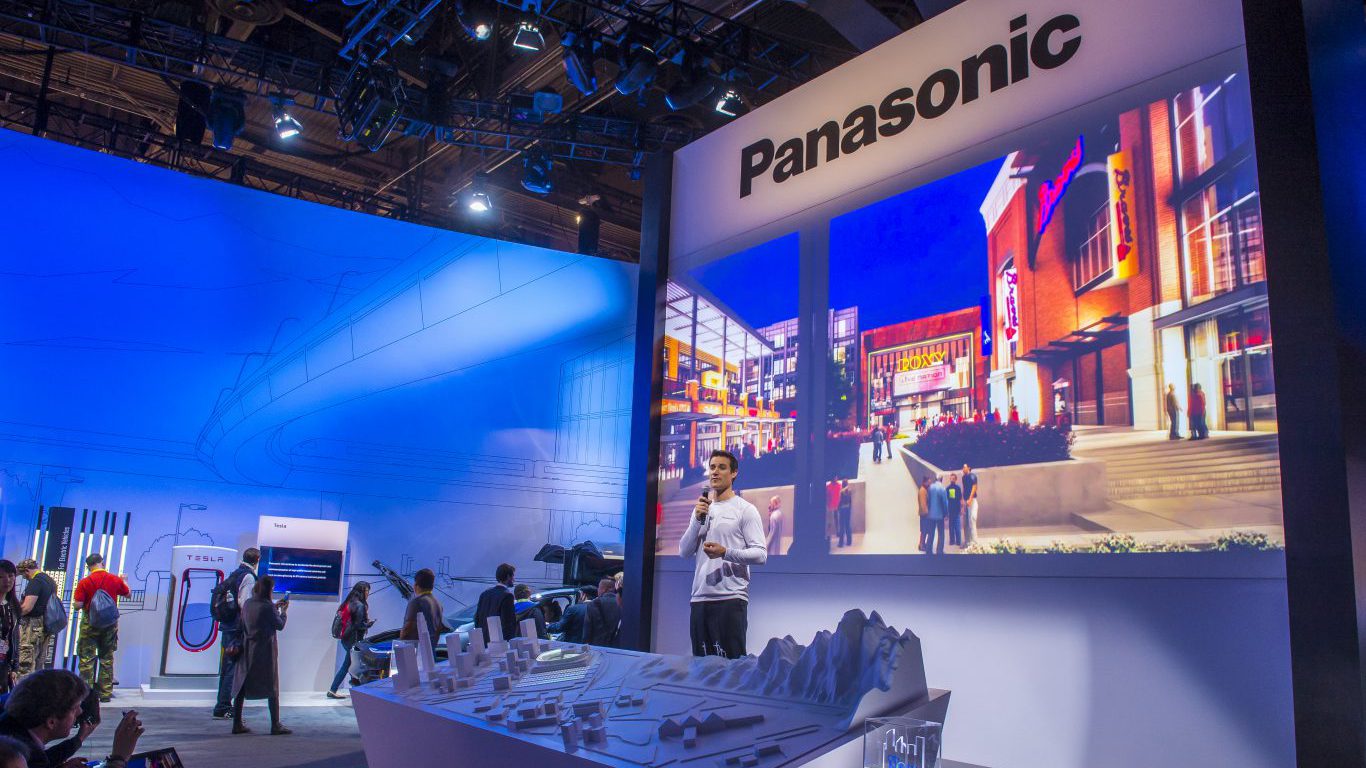
10. Panasonic
> Women in leadership roles: 8% (board), 2% executive
> CEO: Kazuhiro Tsuga
> Industry: Technology
> Notable brands: Panasonic, Hussman, PanaHome
> Revenue: $65.09 billion
Technology companies have faced criticism in recent years for the lack of female representation in the industry. While women comprise 46.8% of the U.S. workforce, just 27.5% of workers in electronics design and manufacturing industries are female. The underrepresentation is even more pronounced in the industry’s senior leadership roles. At electronics manufacturer Panasonic, just one of the 12 board of directors members and just one of the company’s 42 executive officers are women. Panasonic has, however, successfully implemented internal initiatives that aim to increase the number of women in leadership roles, adding roughly 100 female managers over the past four years. Despite the improvement, just 6.9% of managers at the company today are women.
[in-text-ad]
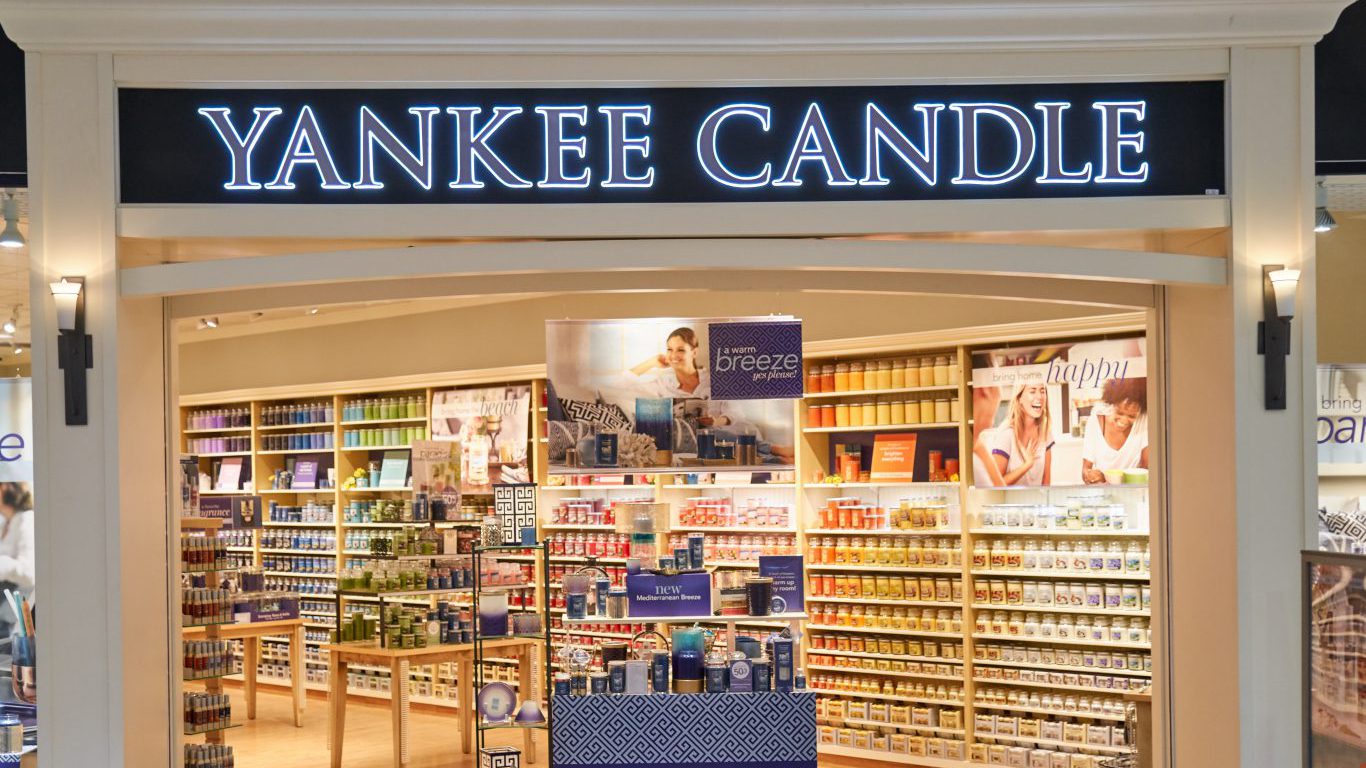
9. Newell Brands
> Women in leadership roles: 8% (board), 0% executive
> CEO: Michael B. Polk
> Industry: Home goods
> Notable brands: Yankee Candle, Rubbermaid, Sharpie
> Revenue: $13.26 billion
Newell Brands owns a myriad of popular brands, such as Rubbermaid, Sharpie and Mr. Coffee, that sell products ranging from scented candles to outdoor recreation equipment to baby toys. While women are the main customers of many of the company’s leading brands, only one of the 12 members of the Newell Brands board of directors is a woman. Ros L’Esperance is the group managing director and co-head of global investment banking for UBS AG, and has sat on the board since April 2016. Newell Brands recently let go of its only female executive, former Chief Human Resources and Communications Officer Fiona Laird, effective September 2017.

8. Toyota
> Women in leadership roles: 7% (board), 0% (executive)
> CEO: Akio Toyoda
> Industry: Transportation
> Notable brands: Toyota, Scion, Lexus
> Revenue: $244.98 billion
Throughout the history of Toyota, many of the company’s top executive roles have been filled by descendants of Sakichi Toyoda, who founded Toyota Industries Corporation in 1926. In the three generations that have followed Toyota’s founding, Sakichi Toyoda and his brother Heikichi have had two sons and one son-in-law, five grandsons, and one great grandson — almost all of whom served or are currently serving as the president of the Toyota Motor Corporation. No female descendant of the Toyoda brothers, however, has held an executive position at the company. The company hired its first female executive in April 2015, but she resigned after just 90 days on the job following her arrest for illegally importing painkillers into Japan. Toyota currently has no women serving in executive positions, and just one woman is serving on the company’s 15-member board of directors.

7. Samsung Electronics
> Women in leadership roles: 0% (board), 0% (executive)
> CEO: Kwon Oh-hyun
> Industry: Technology
> Notable brands: Samsung
> Revenue: $176.12 billion
Samsung is one of the handful of major global companies with zero female representation on its board or executive team. Across the company, women comprise just 25% of all employees. The average woman at Samsung is employed for 2.2 years less than her male counterpart, and earns just 70 cents for every dollar earned by the average male worker. While women are underrepresented at Samsung overall, women have the greatest representation in the company’s most profitable business segments. In 2016, women held approximately 29% of jobs in Samsung’s semiconductor division, which accounted for 21% of the company’s total sales and 47% of annual profits. By comparison, women held just 16% of jobs in Samsung’s TV, monitor, refrigerator, and washing machine division, which accounted for 23% of sales and 9% of total profits.
[in-text-ad-2]

6. Plains GP Holdings
> Women in leadership roles: 0% (board), 0% (executive)
> CEO: Greg Armstrong
> Industry: Energy
> Notable brands: Plains All American Pipeline
> Revenue: $20.18 billion
Oil and pipeline services is one of the most male-dominated industries in the world. While women comprise 46.8% of the U.S. workforce, they comprise just 15.5% of jobs in the pipeline transportation industry nationwide. The underrepresentation of women is even more pronounced in the industry’s senior management roles. At pipeline company Plains GP Holdings, men fill all 12 board seats and eight executive positions. Greg Armstrong has been the company’s CEO since 1992. He also serves as the deputy chairman of The Federal Reserve Bank of Dallas and Chairman for the National Petroleum Council.

5. Energy Transfer Equity
> Women in leadership roles: 0% (board), 0% (executive)
> CEO: Kelcy L. Warren
> Industry: Energy
> Notable brands: Panhandle Eastern Pipeline Company, Lone Star NGL, Sunoco LP
> Revenue: $37.50 billion
Oil and pipeline services is one of the most male-dominated industries in the country. Just 15.5% of pipeline transportation workers nationwide are women, far less than the 46.8% average across the U.S. workforce. Senior management in the oil industry often has even less female representation. Pipeline company Energy Transfer Equity was established in 1995, and has expanded from 200 miles of natural gas pipelines in 2002 to 71,000 miles of natural gas, natural gas liquids, refined products, and crude oil pipelines today. Unlike the extraordinary pipeline growth, the expansion of gender diversity in the company is lacking, or rather entirely absent. As of this point in time, there are no women on Energy Transfer Equity’s board of directors or executive team.
[in-text-ad]
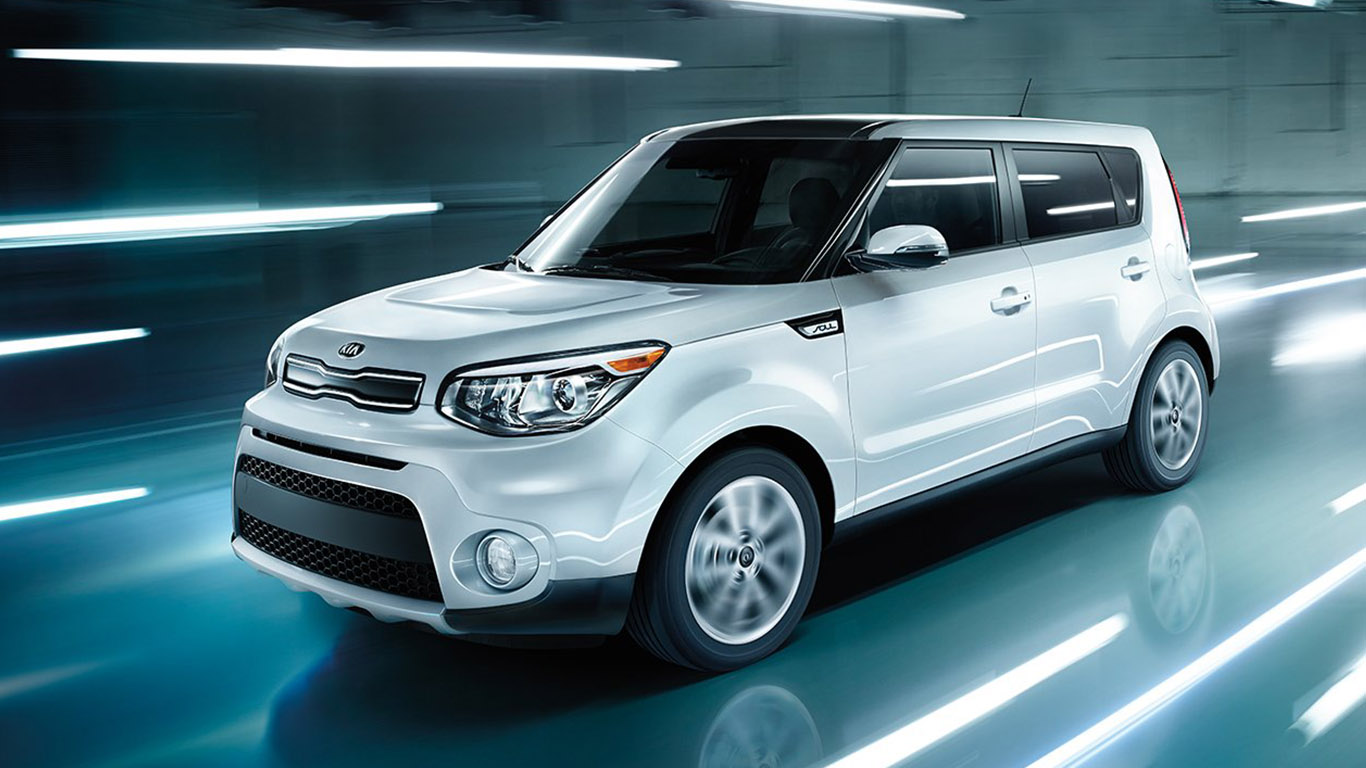
4. Kia Motors
> Women in leadership roles: 0% (board), 0% (executive)
> CEO: Han-Woo Park
> Industry: Transportation
> Notable brands: Kia
> Revenue: $46.00 billion
Kia Motors is one of many major automakers with minimal female representation in its lead corporate roles. Just 27.8% of employees in the motor vehicle manufacturing industry are female, and women are often even more underrepresented in senior management. Kia’s executive positions and board of directors consist entirely of males. Despite the lack of women in leadership roles, Kia is one of the more popular car brands among female consumers. According to sales data compiled by information services company Experian in 2015, three Kia models are among the 25 cars women are most likely to purchase — the Kia Sportage, Kia Soul, and Kia Rio. This is tied with Nissan as the most of any car brand on the list of cars most likely to attract female buyers.

3. Nintendo
> Women in leadership roles: 0% (board), 0% (executive)
> CEO: Tatsumi Kimishima
> Industry: Technology
> Notable brands: N/A
> Revenue: $4.37 billion
Many video game companies have faced criticism in recent years for the lack of appropriate female representation throughout the gaming industry. According to a 2015 survey by the International Game Developers Association, just 22% of developers are female. With no women in any executive position or on its board of directors, Nintendo is a prime example of the lack of female leadership in video gaming. Nintendo has also been the subject of criticism for the portrayal of women characters in its video games. Some critics have asserted the company’s flagship games reinforce gender stereotypes, and that many of Nintendo’s most popular titles lack playable female characters.

2. Nissan Motor Corporation
> Women in leadership roles: 0% (board), 0% (executive)
> CEO: Hiroto Saikawa
> Industry: Transportation
> Notable brands: Nissan, Datsun, Infiniti
> Revenue: $104.17 billion
While women in the United States comprise 46.8% of the workforce, just 27.8% of employees in motor vehicle manufacturing are female. At the world’s largest automakers, women are often even more underrepresented in senior management positions. At the Nissan Motor Corporation, there are no women on the board of directors or in top executive positions.
Some divisions of Nissan, however, have made efforts to close the gender gap in recent years. For example, the Renault-Nissan Alliance — the partnership between French automobile manufacturer Renault, Japanese automaker Mitsubishi, and Nissan — promoted several women to key executive positions in 2016, increasing the share of women on the Renault executive committee to 25%. Additionally, the share of women in management positions at NIssan in Japan is more than double the Japanese average.
[in-text-ad-2]

1. Icahn Enterprises
> Women in leadership roles: 0% (board), 0% (executive)
> CEO: Keith Cozza
> Industry: Other
> Notable brands: N/A
> Revenue: $16.35 billion
Icahn Enterprises is a relatively small investment firm with just seven different people in its senior management and board of directors — yet not one is a woman. Icahn Enterprises has also been the subject of a lawsuit related to the company’s treatment of women. According to a 2009 lawsuit, two women were unfairly fired from Icahn Enterprises after refusing to participate in the company’s cliquey culture. They were also allegedly subjected to sexual harassment by senior executives. One of the earliest incidents of the company’s questionable treatment of women occurred in 1985, after Icahn bought airline T.W.A. He then engaged in a battle with the flight attendants’ union over wages. Icahn insisted that because most flight attendants were women, they were not breadwinners and should not expect compensation on par with male employees.
Detailed Findings and Methodology:
Chico’s FAS Inc. leads the group with the most representation of females in senior management positions, with women holding 73% of executive positions and comprising 56% of the board. At the other end of the spectrum, Icahn Enterprises and six other companies do not have so much as one woman in any one of their management-related or board positions.
Female representation varies by industry. While women comprise 46.8% of the U.S. workforce, just 9.1% of construction workers are women. Similarly, women hold just 13.4% of mining and logging jobs nationwide and only 23.5% of positions in the transportation and utilities industry. Meanwhile, women hold 74.6% of jobs in the education and health services industry, the largest share of any sector.
Women are often significantly underrepresented in senior leadership. According to the public policy research and advocacy organization Center for American Progress, just 14.6% of executive officers in the United States are women, and women hold only 21.2% of board seats on S&P 500 companies. Women often have a greater presence on the senior leadership teams of apparel and retail companies, and very little senior management representation at companies in energy, technology, and transportation-related fields.
Of the 10 companies with the least female leadership, three are car makers, three are consumer electronics manufacturers, and two are oil and pipeline services companies. Of the 10 companies with the most female leadership, five are in the apparel industry, and two are brick-and-mortar retailers.
To identify the companies with the most and least female leadership, 24/7 Wall St. examined data from research group LedBetter, which created an index of the share of women on the board, as well as the share of women in executive leadership positions at 237 global corporations. We reviewed the top 10 companies with the largest shares of female executives and board directors and the 10 with the smallest shares. Figures were updated to reflect current conditions.
Annual revenue figures for U.S. public companies are from financial documents filed with the SEC for each company’s most recent fiscal year. For private companies and companies headquartered outside the United States, revenue figures are from the companies’ most recent annual reports.
Thank you for reading! Have some feedback for us?
Contact the 24/7 Wall St. editorial team.